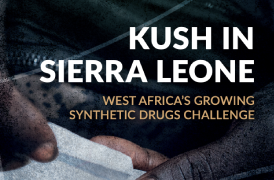Since 2022, a synthetic drug known as ‘kush’, has killed likely thousands of people in West Africa. Kush emerged in Sierra Leone, but quickly spread across countries in the subregion, including Liberia, Guinea, the Gambia, Guinea-Bissau and Senegal, with devastating effects. By April 2024, the health impacts of kush, a synthetic drug containing nitazenes, opioids as – or more – powerful than fentanyl, as well as synthetic cannabinoids, were so acute that the presidents of Sierra Leone and Liberia had declared national emergencies over drug use – an unprecedented step.
This drug represents a turning point in West Africa’s drug landscape. The scale of its market expansion and its lethal public health effects are unparalleled. Yet, amidst widespread speculation about kush, a number of critical questions remained unanswered about the drug. What is kush? Where does it come from? Who is producing and trafficking it? And what can be done to reduce the harm posed by this drug?
Key points
- Kush is a drug that is likely to have killed thousands of people in West Africa, with Sierra Leone as its epicentre.
- Chemical testing of kush found that over 50 per cent of samples contain nitazenes, a very addictive and deadly synthetic opioid comparable to fentanyl, while the other half contains synthetic cannabinoids.
- Some of these substances are imported from China, the Netherlands and most likely the United Kingdom through maritime routes, air and postal courier services. It is unclear if the kush ingredients exported from European countries include nitazenes or only synthetic cannabinoids.
- The market for kush used to be more strongly controlled by large groups but is increasingly fragmented, with smaller actors setting up their own operations.
- Urgent coordinated action is needed on three fronts: 1) better monitoring, early warning, testing and information-sharing in West Africa; 2) disrupting supply chains by China, the Netherlands and the UK, and at Sierra Leonean points of entry; and 3) mitigating the harms of kush consumption.
Since 2022, a synthetic drug known as ‘kush’ is likely to have killed thousands of people in West Africa. Kush emerged in Sierra Leone but quickly spread across countries in the subregion, including Liberia, Guinea, the Gambia, Guinea-Bissau and Senegal, with devastating effects. By April 2024, the health impacts of kush, which contains nitazenes (opioids that can be even more powerful than fentanyl) and synthetic cannabinoids, were so acute that the presidents of Sierra Leone and Liberia declared national emergencies over drug use – an unprecedented step.
Yet, amid widespread speculation, a number of critical questions remained unanswered about the drug. What is kush? Where does it come from? Who is producing and trafficking it? And what can be done to reduce the harm posed by this drug?
These questions are addressed in a new report by the Global Initiative Against Transnational Organized Crime (GI-TOC) and the Clingendael Institute, titled ‘Kush in Sierra Leone: West Africa’s growing synthetic drugs challenge’, by Lucia Bird Ruiz Benitez de Lugo and Dr. Kars de Bruijne.
‘Through our work in West Africa, we kept hearing about kush, but there was a lot of hearsay and myth with very little evidence,’ explained Lucia Bird, director of the GI-TOC’s Observatory of Illicit Economies in West Africa.
‘Without this data, it was impossible to build an effective response,’ she noted.
As part of the research, chemical testing of kush, carried out in cooperation with national authorities in Sierra Leone and Guinea-Bissau, detected nitazenes – potent and often deadly synthetic opioids linked to overdoses across Europe and the US – and synthetic cannabinoids. Research into supply chains and trafficking routes revealed that some of these substances are being imported through maritime routes and postal courier services from China, the Netherlands and most likely the United Kingdom. ‘All three countries own part of the responsibility for the kush crisis and the harm to people in Sierre Leone, and West Africa more broadly,’ said Dr. Kars de Bruijne, head of the West Africa and Sahel programme at the Clingendael Institute.
More at
New report on kush highlights West Africa’s growing synthetic drugs challenge
Lucia-Bird-Ruiz-Benitez-de-Lugo-and-Dr-Kars-de-Bruijne-Kush-in-Sierra-Leone-–-West-Africas-growing-synthetic-drugs-challenge-GI-TOC-and-Clingendael-Institute-February-2025.final_




















